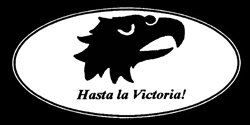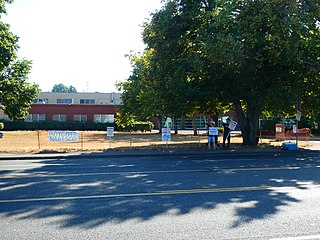Related Research Articles

The United Mine Workers of America is a North American labor union best known for representing coal miners. Today, the Union also represents health care workers, truck drivers, manufacturing workers and public employees in the United States and Canada. Although its main focus has always been on workers and their rights, the UMW of today also advocates for better roads, schools, and universal health care. By 2014, coal mining had largely shifted to open pit mines in Wyoming, and there were only 60,000 active coal miners. The UMW was left with 35,000 members, of whom 20,000 were coal miners, chiefly in underground mines in Kentucky and West Virginia. However it was responsible for pensions and medical benefits for 40,000 retired miners, and for 50,000 spouses and dependents.
The Communist Party (CP) and its allies played a role in the United States labor movement, particularly in the 1930s and 1940s, but largely wasn't successful either in bringing the labor movement around to its agenda or in converting their influence in any particular union into membership gains for the Party. The CP has had only negligible influence in labor since its supporters' defeat in internal union political battles in the aftermath of World War II and the Congress of Industrial Organizations's (CIO) expulsion of unions in which the party held the most influence in 1950. The expelled parties were often raided by stronger unions, and most withered away.
The Communist Party USA, ideologically committed to foster a socialist revolution in the United States, played a significant role in defending the civil rights of African Americans during its most influential years of the 1930s and 1940s. In that period, the African-American population was still concentrated in the South, where it was largely disenfranchised, excluded from the political system, and oppressed under Jim Crow laws.

The Farm Labor Organizing Committee (FLOC) is a labor union representing migrant farm workers in the Midwestern United States and North Carolina.

The Bakery, Confectionery, Tobacco Workers and Grain Millers International Union (BCTGM) is a labor union in the United States and Canada primarily representing workers in the food processing industry. The union was established in 1886 as the Journeyman Bakers Union. The contemporary BCTGM was formed in January 1999 as a merger of the Bakery, Confectionery and Tobacco Workers' International Union and the American Federation of Grain Millers.
The United Cannery, Agricultural, Packing, and Allied Workers of America (UCAPAWA) was a labor union formed in 1937 and incorporated large numbers of Mexican, black, Asian, and Anglo food processing workers under its banner. The founders envisioned a national decentralized labor organization with power flowing from the bottom up. Although it was short-lived, the UCAPAWA influenced the lives of many workers and had a major impact for both women and minority workers in the union.
The United Cannery, Agricultural, Packing, and Allied Workers of America union (UCAPAWA) changed its name to Food, Tobacco, Agricultural, and Allied Workers (FTA) in 1944.
The National Negro Labor Council (1950–1955) was an advocacy group dedicated to serving the needs and civil rights of black workers. Many union leaders of the CIO and AFL considered it a Communist front. In 1951 it was officially branded a communist front organization by U.S. attorney general Herbert Brownwell.

Leon E. Bates Sr. was an American labor union leader with the United Auto Workers union (UAW) from 1937 to 1964 when he retired as an "International Representative" of the UAW. He was one of the first African-American union organizers to work for the "UAW-CIO".

Lucy Randolph Mason was an American labor activist and suffragist. She was involved in the union movement, the consumer movement and the civil rights movement in the mid-20th century.

The Congress of Industrial Organizations (CIO) was a federation of unions that organized workers in industrial unions in the United States and Canada from 1935 to 1955. Originally created in 1935 as a committee within the American Federation of Labor (AFL) by John L. Lewis, a leader of the United Mine Workers (UMW), and called the Committee for Industrial Organization. Its name was changed in 1938 when it broke away from the AFL. It focused on organizing unskilled workers, who had been ignored by most of the AFL unions.
Larus and Brother Company (1877–1968) was a diversified tobacco company headquartered in Richmond, Virginia. The company manufactured pipe tobacco, cigarettes, and charcoal. It also operated local radio and television stations.
Louise "Mamma" Harris was an American labor organizer and tobacco worker. Harris became involved with the Congress of Industrial Organizations (CIO) in Richmond, Virginia. In 1938, she led a successful strike against the tobacco factory where she worked.
The 2021 Frito-Lay strike was a labor strike by employees at the Topeka, Kansas Frito-Lay plant against the company's mandatory overtime policy. The strike began on July 5, 2021 and ended on July 23, 2021.

The 2021 Nabisco strike was a labor strike involving workers for the American snack manufacturer Nabisco, a subsidiary of Mondelez International. The strike began at a Nabisco facility in Portland, Oregon on August 10 and over the next few days spread to several more Nabisco facilities throughout the United States.
Daniel Edward Conway was an American labor union leader.
The American Bakery and Confectionery Workers' International Union (ABC) was a labor union representing bakery workers in the United States.
The American Federation of Grain Millers (AFGM) was a labor union representing workers in the milling trade in the United States.
Henry O. Mayfield was an American miner and social activist. Mayfield was one of the Black miners who played an active role in forming the new Congress of Industrial Organizations (CIO) between 1935 and 1955; he also had a leadership role in the SNYC. He served the United States as a soldier in World War II; afterwards, he and other veterans worked to support voting rights. He worked with other Black leaders in the Congress of Industrial Organizations to advocate for the rights of laborers, especially in the southern United States. Mayfield was watched by the FBI and was arrested for his work in the Communist Party and advocacy for civil rights. Mayfield served as chairman of the board for Freedomways Associates, the publishing company for the cultural magazine Freedomways, up until his death.
Frank Hurt is an American former labor union leader.
References
- 1 2 "Inactive Organizations" (PDF). UMD Labor Collections. University of Maryland. Retrieved 18 April 2022.
- 1 2 3 Northrup, Herbert R. (1942). "The Tobacco Workers International Union". The Quarterly Journal of Economics. 56 (4): 606–626. doi:10.2307/1883412. JSTOR 1883412.
- ↑ Tobacco Workers International Union. (1915). Abolish child slavery, make union conditions by purchasing union labeled tobacco, snuff and cigarettes. Louisville, KY: publisher not identified.
- 1 2 Fletcher, Bill, Jr., and Peter Agard. "The Indispensable Ally: Black Workers and the Formation of the CIO." The Dispatcher, February 2000
- ↑ Dries, M. E. (1999). Into the lion's den: TWIU Local 208's fight for seniority rights and civil rights in the Liggett and Myers tobacco plant in Durham, North Carolina, 1937–1968.
- 1 2 3 4 5 6 7 8 9 Notable Names in American History. Clifton, New Jersey: James T. White & Company. 1973. p. 559. ISBN 0883710021.